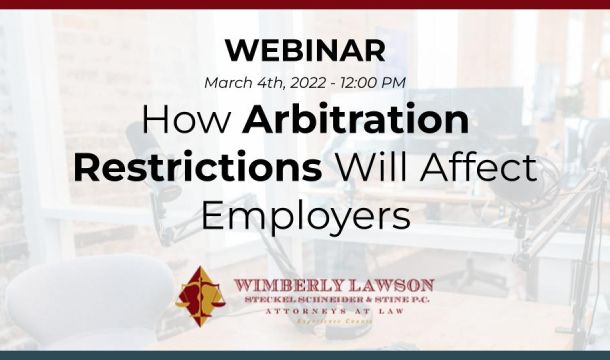Landmines in Medical Related Leave: How to Deal with an Employee Who Has Exhausted Fmla Leave but Cannot Return to Work for Medical Reasons
Employers mistakenly believe they may terminate an employee with a medical condition who has used 12 weeks of Family and Medical Leave (FMLA) leave, or the period allowed by a company no-fault leave policy providing for the separation of an employee after a specified period of time. In fact, employers often painfully learn they may not always do so. In addition to the FMLA, the Americans with Disabilities Act Amendments Act (ADAAA) also protects employees with medical issues preventing them from working, and this protection may include more leave than provided for under the FMLA and/or modification of a no-fault leave policy.
The ADAAA covers employers who employ 15 or more people in at least 20 calendar weeks in the year in which the challenged employment action takes place, or who did so in the prior year. In other words, all employers who are subject to the FMLA, plus many more, are subject to the ADAAA. Although most employers recognize that the ADAAA requires employers to provide reasonable accommodation to disabled employees who need such an accommodation in order to achieve an equal employment opportunity, we find that employers do not always recognize that a leave of absence, including unpaid leave in excess of the 12 week FMLA period and/or company policy might be a reasonable accommodation.
As with many issues arising under the ADAAA, the meaning of "reasonable accommodation" is unclear and depends on the facts and circumstances in the individual case. The EEOC Enforcement Guidance on Reasonable Accommodation and Undue Hardship expressly states that leave in excess of that which might otherwise be available may be a “reasonable accommodation” and that application of a no-fault leave policy to a person with a disability may violate the ADAAA, unless (1) there is another reasonable accommodation that would enable the employee to perform the essential functions of his or her position; or, (2) doing so would impose an "undue hardship" on the employer.
Of course, determining what an "undue hardship" is may often be difficult, since it must be determined with consideration of the specific facts and circumstances of the individual case. In general, however, employers should remember that any burden is not sufficient to show an "undue burden." Rather, an "undue burden" is limited to those specific accommodations that would impose a "significant difficulty or expense" on the employer. In determining whether any accommodation, including, but not limited to leave would pose and undue burden, employers are instructed to consider:
- the nature and cost of the accommodation needed;
- the overall financial resources of the facility making the reasonable accommodation; the number of persons employed at this facility; the effect providing the accommodation would have on the expenses and resources of the facility;
- if the facility at which the employee works is part of a larger entity, the overall financial resources, size, number of employees, and type and location of the entities' facilities;
- the type of operation of the employer, including the structure and functions of the workforce, the geographic separateness, and the administrative or fiscal relationship of the facility involved in making the accommodation to the employer;
- the impact of the accommodation on the operation of the facility[1].
In addition, there are other considerations which should be considered when the requested accommodation is leave in addition to that available under the FMLA and company policy. By way of example only, employers should consider how long the employee and their doctor believe the employee will need to be on leave and how certain they are that the employee will be able to return at the end of that period. If it is very uncertain whether the employee may ever be able to return to work, it may be acceptable to terminate the employee at the end of FMLA or the period of leave allowed by an internal company policy. And, although it is not a rule, but just a consideration, courts have been reluctant to require employers to hold jobs open for more than six months, especially if it is uncertain whether the employee will be able to return at that time. Regardless of whether an employee is on leave protected by the FMLA or company provided leave, employers can require the employee to request an extension of the approved leave on or before its expiration. If an employee does not do so, the company can apply its regular attendance/absence policy unless there was an acceptable reason for the employee not doing so, e.g., they were incapable of doing so due to a disability.
So what is an employer to do when an employee has exhausted FMLA leave and/or a company leave policy and still cannot return? First and foremost, remember that the 12 week FMLA period only means that the employee is not entitled to additional leave under that law, and that the company policy is trumped by the ADAAA. Second, ask the employee to provide information, including from their health care provider, as to the expected return to work date and the certainty that the employee will be able to return to work at that time. Third, think about the impact on finances and operations of allowing the employee to take leave for the estimated period of time. Fourth, because this really can be a minefield, it is recommended that you get legal advice before terminating the employee.
[1] See 42 U.S.C. § 12111(10)(B) (1994); 29 C.F.R. § 1630.2(p)(2) (1997); 29 C.F.R. pt. 1630 app. § 1630.2(p) (1997).
Get Email Updates
Recent Content

TPS Update (as of 2/6/2026)

Job Interviews Can Be a Good Selection Device

Suggestions on How to Diffuse a Tense Situation

Employers Blame Unions for Recent Shutdowns

$27 Million Verdict against Employer on Disability Discrimination over Refusal to Return Employee to Work



